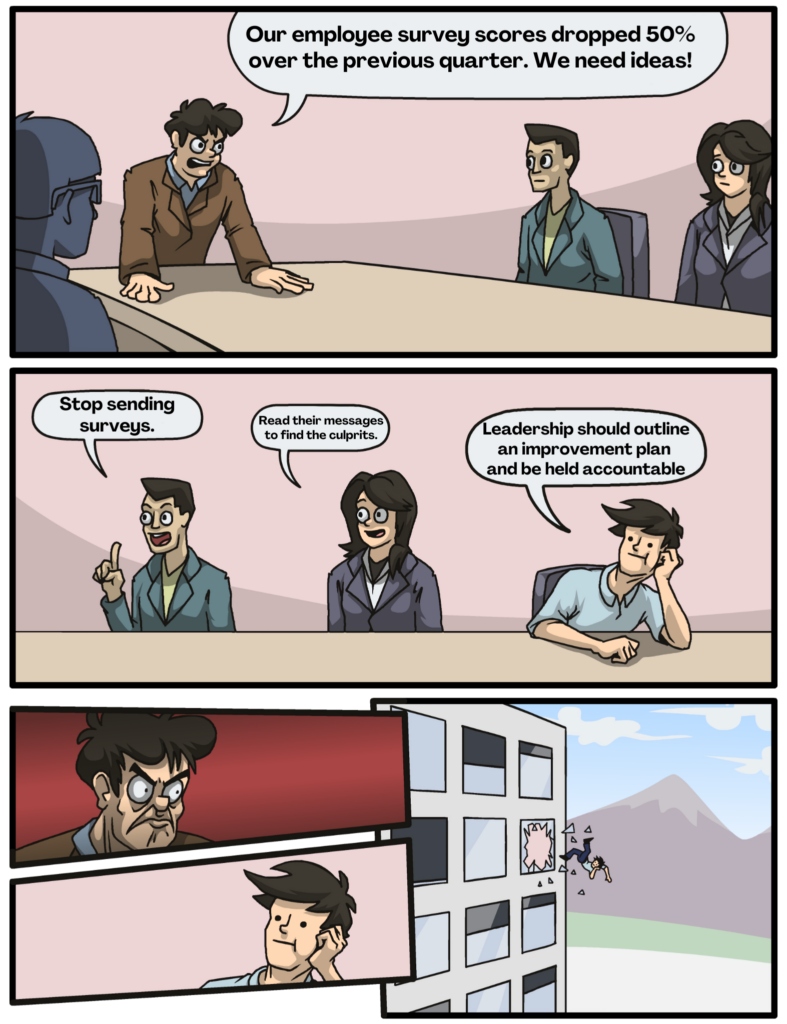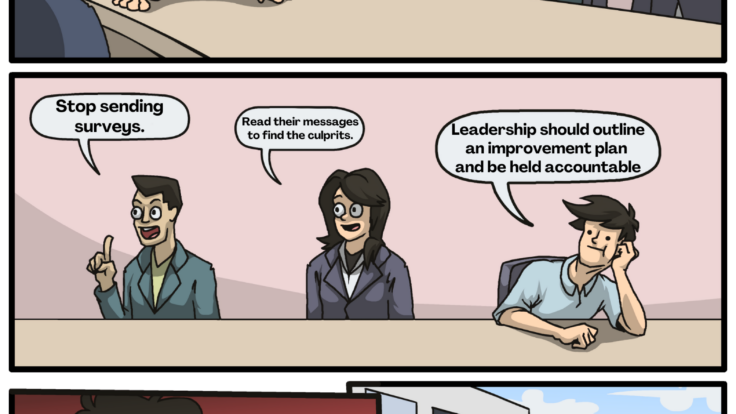Surveys often focus on vague questions benefiting leadership, not employee needs. While rising scores create a temporary sense of progress, declining scores reveal the true nature of bad leadership.
Employee surveys feed workplace toxicity. They give leadership a tool to misdirect employees toward concerns of low importance and create opportunities to self-aggrandize a smoke-and-mirror culture of empathy, communication, and equality.

How surveys accomplish this is straightforward.
When surveys are sent out for the first time, employees will score lower across all questions. Leadership then targets a handful of the lowest scores and publicly commits to improving.
During the following quarter, they institute new policies that add transparency and communicate frequently with employees about those changes. This makes employees feel heard, valuable, and an integral part of the organization.
The next time the surveys are sent out, the scores will be higher in those targeted areas. In areas where leadership did not commit to change, scores will rise as employees feel more goodwill and optimism towards leadership teams – the rising tide lifts all boats.
Why is this a problem?
What leadership is committing to change are superficial issues that create a temporary sense of progress. This is another way to say that they mask deeper problems and allow leadership to avoid addressing those fundamental issues.
You will note that these surveys never ask:
- Is your compensation adequate relative to your cost of living?
- Does bullying or harassment happen in the workplace?
- Are there clearly defined work hours and are you expected to work outside of these hours?
- Are you being micromanaged?
- Should we develop on-site childcare, or would direct reimbursement make more sense (utilizing space for alternative purposes)?
- Are people encouraged to spend time with family and personal pursuits and hobbies?
- Are there enough opportunities internally for training and growth?
- Would expectations for productivity be more realistic if we added staff?
- Are there programs to help struggling employees address personal issues?
- Could we offer flexibility for those who prefer hybrid or remote work situations?
- Are leaders held to the same standard as employees concerning culture and behavior?
- Does the current office layout benefit your job functions?
Answering these questions demands strategic thinking and long-term planning. It also requires leadership to be accountable and offer employees a level playing field.
Which is why they do not ask those questions. Instead, they ask:
- Does everyone have a priority?
- Are meetings held on time?
- Do we communicate well?
- Is the company on the right track?
- When we say we will do something, do we do it?
These questions are crafted to benefit leadership because they are nonspecific and do not place any burden on themselves to act. The goal is to sedate and disincentivize employees from recognizing their inherent worth.
But why do employees not see through the ruse?
A common reason is that when you like the people you work with and know their situations, being honest on surveys or questioning the motives of leadership could put them and you at risk. Everyone wants to make the best of their situation. At work, that often means being seen as a team player.
Another reason is the gamification of surveys. When you see rising scores that must correlate with success, providing a hit of dopamine and creating that feedback loop where if scores slip even a little, you might start scoring higher to feed your desire to “win.”
Whatever the case, so long as survey scores rise, everyone is happy.
But what happens if scores drop?
When Surveys Go South
If survey scores fail to improve or fall off from previous heights, the underlying toxicity of these surveys and the true nature of leadership bubbles up to the surface.
This typically happens when you reach the inevitable breaking point for employees where they ask “what matters to me” instead of “what leadership wants the perception of the workplace to be.”
Ironically, as survey scores improve, employees will naturally feel that they have earned the right to something more. Such as questioning their current role and compensation or other things that the surveys they score do not address.
What happens in the following survey is that the employee will score each question lower as a kind of protest. Since employees communicate, others begin to question what matters to them, and they give lower scores where they had previously scored questions higher.
Down and down they go.
And instead of addressing these new concerns, leadership will fall back to gaslighting employees:
- “We take time from our families and busy schedules each month to address these matters, but some of you hold grudges or are unhappy here and want to jeopardize the organization.”
- “Surveys reflect a need for all of us to come together. Leadership works hard to support our many team members across our business units, sales, technology, marketing, or customer relations, and if we do not improve as a whole, then that hurts our position in the market, makes us slower, and puts pressure on us to reduce headcount.”
Leadership’s failures always fall back onto employees, with a strong underlying position that if you do not make us look better, we might have to clear desks, which will be your fault.
Even if those low scores do not reflect the company’s standing position in the market, culling a few well-liked people can help boost scores.
Alternatively, leadership can find and root out the culprits.
The easiest way is to make the survey less transparent. Say it is anonymous, but add a token to the email address of the person who clicked the link. Label those individuals as poor fits for the culture they are trying to build (hostility and fear).
Another direction is to get the intern to eavesdrop on conversations around the office and report back to leadership.
No one on a leadership team would put a young and impressionable person in such an impossible position and not face any consequences, right?
A company’s desperation for high survey scores is reasonable. If a company is perceived as good, people will work harder, employee retention should improve, skilled workers will want to work here, and revenues may rise.
Despite all those efforts, if scores fail to improve, surveys will no longer be sent out or discussed.
Communication among employees is discouraged.
People warn you to delete your Slack messages or clear out your email. Go outside to talk about problems. Never write anything down.
Many toxic companies seem to be facing this inevitable end, and they deserve whatever happens – which is often nothing.
Your Toxic Company Should Survive
Not every workplace can address fundamental issues of wage, career growth, or flexibility. In that case, skip the surveys and be honest about that. Find a balance through over means or offer non-monetary compensation.
Others should operate as the meat grinders that they are, provided leadership stops complaining about retention, productivity, and other business issues related to not addressing real issues affecting employees.
Instead, stick to the usual vapid jargon to describe how the company will:
- “Run the extra mile.”
- “Raise the bar.”
- “Become a team that is part of a division.”
- “Mine the data.”
- “Expand the scope of opportunity.”
- “Focus on collaboration”.
- “Add teams focused on business objectives.”
- “Deliver achievable quarterly objectives.”
As an employee, you must be aware of your value. Do not allow toxic workplaces to entrap you into a cycle of corporate self-help. You should not be the solution to leadership’s follies. They do not need you to answer whether communication is good or not.
If they have to ask, it is not. And they know that. They are merely asking as a means of manipulation and to distract you from what should matter to you.
Most importantly, do not wait long enough to see what happens when survey scores fall and toxicity overwhelms the workplace. Take ownership of your career and look for companies with leadership who take to heart the issues affecting employees and commit to reaching an amicable resolution.



